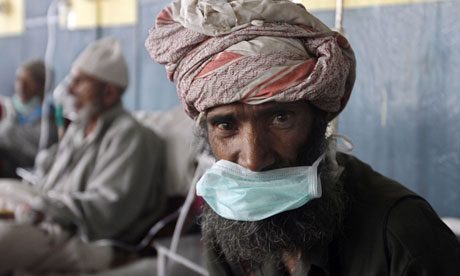
Since 1971, Davos has been the playground of the rich and powerful, a small Swiss resort that once a year hosts a glittering party for hypertrophied egos and atrophied minds. But in the 1920s Davos was the luxurious destination for a different category of the wealthy – those suffering from tuberculosis. I wonder if Klaus Schwab chose Davos for gatherings of his World Economic Forum with a deliberately ironic eye: a place where those who come to pay homage to their global self-importance dance unknowingly on the graves of their prematurely deceased forebears.
Helen Bynum has written a book not only full of diverting asides but also of urgent importance. Her project began as a biography of a disease. This task she discharges perfectly well. She writes concisely, covering 35,000 years of an infectious condition that has left a strong literary as well as scientific footprint (she begins with George Orwell and ends with John le Carré). She never allows her historical exposition to lead the reader into scholarly cul de sacs. Instead, she briskly recounts the story of germ theory, identification of the bacterial cause (Mycobacterium tuberculosis), the sanatoria, the gradual control of the disease, setbacks, wrong-turns, controversies, and two Nobel prizes (Robert Koch in 1905 for his "investigations and discoveries" about tuberculosis; and Selman Waksman for streptomycin, the first antibiotic effective against the disease).
But Spitting Blood evolved beyond a chronology of inspired events and famous names into a compellingly serious argument. It is hard to accept the atrocious toll this ancient disease still takes on human life, despite several centuries of concerted scientific effort. Bynum rightly castigates the "casual disregard" we have shown this deadly condition. Each year, almost 9m new TB infections take place and there are 1.4m deaths. Tuberculosis kills the young, and the disease is an important reason why many nations remain paralysed by poverty. Eighty per cent of the world's cases of tuberculosis are to be found in just 22 countries: surely it cannot be beyond human ingenuity to focus efforts on this small group of nations? Unfortunately, it seems that it is. To be fair, some of these countries are vast continents of land that make control programmes exceptionally challenging (India and China). Others (Afghanistan and the Democratic Republic of Congo) are so riven by conflict that even the idea of a national public health campaign can barely be conceived, or suffer from a political leadership that seems shockingly indifferent to the health of its people (Russia).
There is progress. Deaths from TB have fallen by two-fifths since 1990. And the incidence of new cases is in decline too. But TB is extraordinarily adaptable, cheating efforts to destroy it with the few medicines we have left. Every year, there are more than 400,000 new cases of multi-drug resistant TB. At least this strain of the bacterium is still treatable with more expensive second-line drugs. But the emergence of what is called "extensively drug-resistant" (XDR) tuberculosis has unleashed on the world a virtually untreatable disease. It has now been found in 77 countries. In the war between human beings and bacteria, tuberculosis is beginning to win.
This failure to defeat TB – there has been no breakthrough in efforts to discover a vaccine for adults – reveals clues about our own vulnerability against other infectious threats, such as pandemic influenza. A magical technological solution to TB or other contagious hazards is not the only answer we should be seeking. Bynum uses the history of the NHS to show the importance of a strong health system, offering benefits of free diagnosis, care and support to those with debilitating or life-threatening disease. Universal access to high-quality care is essential for the effective control of a disease such as TB. A government that chooses to unpick the net of social protection, as the current coalition is doing, will damage one of the most important defences we have against epidemic disease.
The approach taken by most international bodies, such as the World Health Organisation, the Bill and Melinda Gates Foundation and donor governments, is to support what are called "vertical" programmes – that is, initiatives that focus narrowly on one specific issue to the almost total exclusion of all others. This is the way diseases such as Aids and malaria, as well as TB, have been attacked in the past. The more "horizontal" approach to improving health – building a national health system – is unfashionable today. Yet one of the most important reasons why we fail to control TB is that we pay insufficient attention to universal access to life-saving interventions delivered through an effective health system such as our own NHS.
The history of TB also proves an unpalatable truth about the progress of science. Reading Bynum, one cannot fail to be impressed by the domination of Europe in the story of this disease. Koch, together with Battista Morgagni, René Laënnec and others led the scientific charge against this once mysterious infection: this was continental European medicine in its heyday, triumphant in its powerful ability to discover. Yet European science was long ago overtaken by the hegemony of the US, which itself faces fresh competition from emerging scientific centres, such as China. In the history of TB, the turning point came in the 1930s and 40s. It was then that Waksman forged an alliance between American university research and an embryonic pharmaceutical industry to create the collaboration that produced streptomycin.
But perhaps the major conclusion of Bynum's investigation is that TB is not simply an infectious disease – it is a social disease. It attacks the poor, the underprivileged and the vulnerable. Its defeat will come from continued social progress that pays attention to poverty, education and housing as much as it does to new medicines and vaccines. The gains that have been made this past decade are only fragile successes. They can easily be broken. Bynum's book is a call to action.
• Richard Horton is editor of the Lancet.

